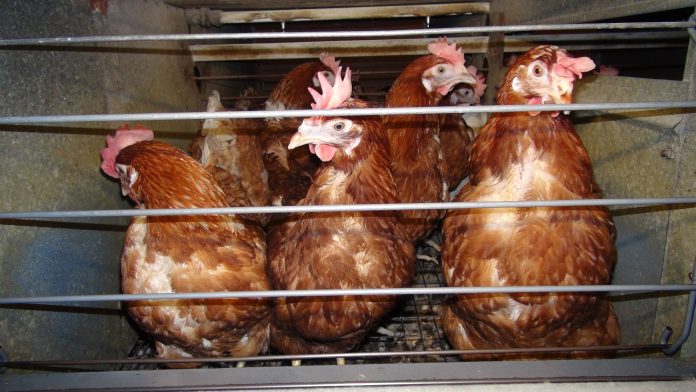
|
Colorful Easter eggs brighten up the holidays for many at this time of the year, but conditions for laying hens are everything but “egg”-xiting all year round, an animal welfare group said Monday. Laying hens face broken bones, trimmed beaks and even cannibalism and most birds are kept in cages, confined to a space of the size of an A4 paper. The European Union annual consumption has even reached more than 200 eggs per capita. More than 350 million laying hens in the European Union are “producing” close to 6.7 million tonnes of eggs each year. One week before Easter, global animal welfare organization FOUR PAWS called for an end of the cage age and calls on consumers to reduce, refine and replace animal-based products, like eggs which would improve the lives of billions of chickens worldwide. “When eating their breakfast egg, people often forget that billions of chickens are suffering from the cruelties of the egg industry. Consumers can make a difference for animal welfare by making a conscious and animal-friendly diet decision,” said Corinna Reinisch, Farm Animal Welfare Campaigner at FOUR PAWS. Breaking bones – the high costs of high performance “The growing demand of the egg industry is literally breaking laying hens, leading to painful fractures as their bones brittle from within,” explained Reinisch. As the calcium for the eggshells stems from the hen’s own body, the majority of laying hens suffer from osteoporosis, caused by high performance breeding. Today an individual hen is “producing” 300 eggs per year on average, as opposed to 180 eggs in the 70s. A study from the University of Copenhagen shows that more than 85% of laying hens are suffering from keel bone fractures. To improve the situation for laying hens, FOUR PAWS urges the European Union to include breeding issues in EU legislation on animal welfare. A short and cruel life Despite their natural life expectancy of 15 years, laying hens rarely outlive 20 months, as they get disposed by the egg industry once their laying performance decreases. The same sad fate awaits male chicks, who are worthless to the egg industry and are killed after their birth. In the European Union alone, more than 330 million one-day-old male chicks get killed every year. FOUR PAWS calls for an end of killing male chicks. Cannibalism & feather pecking: fighting for limited space Chickens are very active animals and therefore require much space. To follow their natural behavior, they should live in small groups and be provided with quiet and separate places in barns, easily accessible nests, areas where they can peck for food, dustbathing options and outdoor access. The reality however looks much different for the majority of laying hens. Most are kept in cramped and dirty cages and spend their short lives in inhumane conditions without daylight and standing on wire mesh floors,the group said. Many caged laying hens have to fight over the little space that they have and resort to feather pecking and even cannibalism. To reduce injuries, many laying hens get their beak trimmed without anesthesia, which is very painful, as the beak is the most sensitive body part of chickens and can be compared to human fingertips. End the Cage Age Many consumers oppose the cruel practice of cage keeping. In the European Union 1.4 million citizens signed the “End the Cage Age” European Citizens’ Initiative in 2020, which asked for a general ban on all caged farming and to move towards cage free solutions. “We must end the cage age now. Europeans have made it crystal clear that they want to see an end to these cruel keeping conditions. It is high time for the Commission to act upon the electorate’s will and improve the welfare of chickens and other farm animals,” Reinisch said. Despite the European Commission’s initial commitment to propose legislation to ban cages by the end of 2023, this has not been initiated. This issue has also been brought before the Court of Justice in Luxembourg, as the Citizens’ Committee of the successful End the Cage Age European Citizens’ Initiative has recently started legal action against the European Commission over its failure to deliver its commitment to ban caged farming. FOUR PAWS is backing this claim. Guidelines for consumers: How to avoid the bad eggs In the European Union consumers can identify the keeping form by the first digit on the egg stamp: 0 stands for organic farming, 1 for free range, 2 signifying barn housing, 3 labeling cage keeping. The majority of laying hens in the EU are kept in cages (40%), followed by barn housing (38%), where up to 6,000 laying hens may be kept in one hall (nine hens per square meter), causing crowd-induced stress. Roughly 15% of laying hens in the European Union are kept in free range, where the conditions in the barn correspond to those in barn housing but chickens have at least 4 m² of exploration space per animal during the day. Almost one third of laying hens (28%) in the EU are kept in organic farming, where each chicken has at least 4 m² of exercise space and the maximum number of chickens is reduced. FOUR PAWS calls on consumers to make a difference with their daily buying decision by:
|















